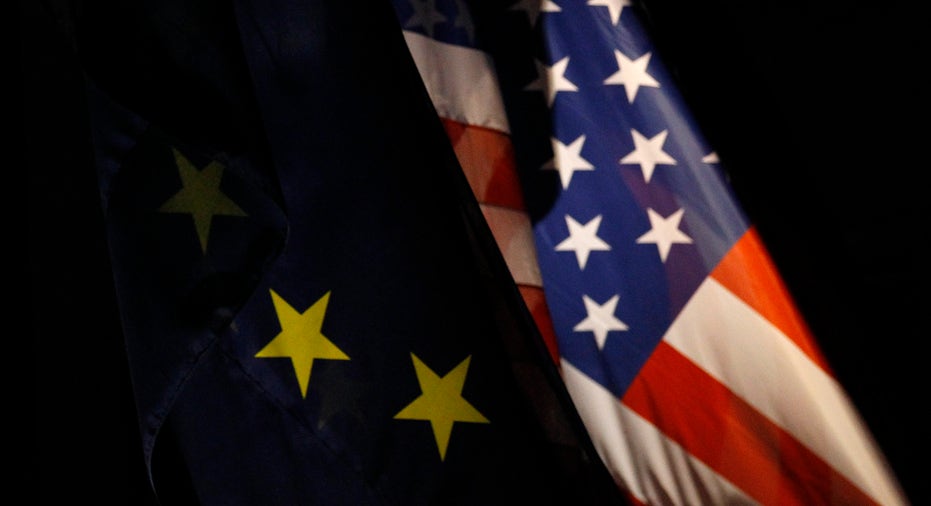Missing: Shock and Awe in Europe’s Crisis Response

Love it or hate it, everyone can agree that Hank Paulson’s September 2008 request for a $700 billion blank check from Congress was bold.
It was also the exact opposite of Europe’s glacier-speed response to its current crisis, which has hovered like a black cloud over the global economy for nearly three years.
While Paulson and Fed chief Ben Bernanke embraced an urgent “shock-and-awe” approach to avoid a depression, European leaders have all too often relied on a “wait-and-see” response.
“Europe's response is best described by the word 'dysfunctional,'” Cam Harvey, a finance professor at Duke University, said in an email. “They delay the inevitable with a series of band-aids knowing full well that major surgery is needed.”
This thinking can help explain the global markets’ collective “meh” reaction to the deal reached over the weekend to hand Spanish banks a roughly $125 billion bailout.
To be sure, the U.S. response was hardly perfect.
After failing to see the worst crisis since 1929 coming, officials took an ad-hoc approach to failing big banks (see: Bear Stearns, Lehman Brothers) for the first six months until unveiling $700 billion TARP, which was initially shot down by Congress in dramatic fashion.
“Even though there were some blips in the U.S. experience,” Harvey said, “we were able to move decisively and with speed.”
That speed and decisiveness may have helped avert a second depression and paved the way for the eventual recovery.
‘Still No Closure’
On the other hand, investors and market watchers are understandably sick and tired of Europe’s debt mess. After all, the crisis unofficially kicked off at the end of 2009 when questions about Greece’s finances first emerged.
While that episode and eventual bailout should have spurred policymakers in Europe into decisive action, more than two years have gone by without a credible solution or end game in sight.
“They delay the inevitable with a series of band-aids knowing full well that major surgery is needed.”
“Europe reacted slower and never really overwhelmed the markets. There was no shock and awe like sometimes the Federal Reserve and Treasury did,” said Marc Chandler, global head of currency strategy at Brown Brothers Harriman. “There’s still no closure.”
Only now are European leaders being pushed by Tim Geithner to conceive a TARP-like rescue effort, sources told FOX Business’s Charlie Gasparino.
“They need to put a lot of pieces together and fire multiple bazookas,” Anton Schutz, president of Mendon Capital Advisors, told FBN.
Structural Issues Loom
Of course, there’s a good explanation for why Europe hasn’t responded more emphatically.
While the Wall Street crisis focused on one country with a single central bank, Congress and Treasury, the eurozone episode involves 17 different nations, each with their own central bank, Treasury and legislature.
These structural differences create much larger hurdles for European leaders, some of whom believe the crisis must worsen before individual governments will agree to further losses of sovereignty.
“The euro crisis is much more complicated than the banking crisis because it’s a multilateral problem and you need coordination,” said Luigi Zingales, author of A Capitalism for the People and a member of the Committee on Capital Markets Regulation.
The structural problems also leave open the possibility that Greece or another troubled eurozone member could exit the currency union -- something that was unthinkable during the U.S. crisis.
Waiting Game Prolongs Economic Pain
Yet each time the can is kicked down the road by European leaders, the global economy suffers, making it even harder for debt-ridden eurozone nations to grow their way out of the mess.
Zingales, who is a professor at the University of Chicago, said Europe’s response has “created uncertainty, which is very costly for the economy. People don’t invest when they don’t have a clear picture of the future.”
This erosion of confidence means that businesses aren’t likely to hire workers or invest in capital projects, while consumers hesitate to spend, further hurting the economy.
In addition to prolonging the economic uncertainty, Europe’s slow response increases the so-called redenomination risk hovering over eurozone banks. This risk refers to the likelihood of depositors from weak euro nations like Greece shifting their funds to stronger nations due to fear their cash will be returned to them in a new devalued currency.
“Once it’s out of the tube it’s very difficult to put back in,” said Chandler.
The wealth transfer tends to disproportionately hurt average citizens because well-off Europeans tend to stash their cash offshore anyway, Harvey noted.
Integration Takes Time
Chandler said that while the European crisis response has been slower, officials have been able to create “greater institutional reform and capacity.” He pointed to the European Central Bank’s decision to buy sovereign bonds and the creation of a permanent bailout fund, the 500 billion euro European Stability Mechanism.
Germany has hinted at further reforms that could bring supervision of eurozone banks under a central body rather than individual central banks.
“I think it’s too early to write the epithet,” said Chandler. “Integration isn’t going to take place at one summit. It’s an evolutionary process.”
The question still lingering in the minds of investors is what will be the state of the global economy once that process finally culminates.



















